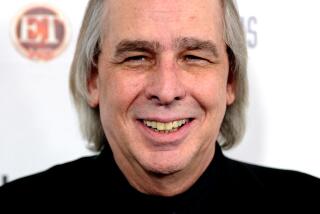KSCA Taking Small Bites for Starters : Pop Beat: Though the young adult-alternative station’s ratings aren’t much better than those of the old KLIT, it’s building a quality fan base.
When KSCA-FM (101.9) launched its adult-alternative format 15 months ago, many disaffected rock fans thought it might signal the beginning of a radio revolution.
To fans alienated from the hip-hop, Top 40 and harder-edged rock that dominates most pop formats, the station seemed an aural oasis, offering an eclectic mix of generally softer, more thoughtful music by artists such as Van Morrison, Sheryl Crow, Counting Crows and Hootie & the Blowfish.
But far from creating a major splash in the nation’s No. 2 radio market, KSCA has barely caused a ratings ripple.
While the station has attracted a loyal following of listeners who speak of it in almost reverential tones, its ratings until recently were only slightly higher than those garnered by the easy-listening station that previously occupied its spot on the dial under the already-forgotten call letters KLIT.
KSCA attracted only 1.4% of Los Angeles and Orange County listeners--about one-third as many as the region’s top-rated stations--during the Arbitron ratings period that ended Sept. 13, leaving the station 25th in the market.
Of the more than 1 million people who turned on the radio to listen to some form of pop music from rap to ranchera to rock during an average quarter hour last summer, only about 24,000 tuned to KSCA.
“Ratings-wise, it has not lived up to the industry’s expectations,” says Shawn Alexander, alternative-music editor at Radio & Records magazine. “All eyes in the industry were watching this station as kind of the role model to see whether this format was going to expand into other markets and whether this format was going to reach the next level.”
The adult-alternative format, which generally eschews the formulaic approach of ‘90s radio playlists and incorporates the free-form spirit of the old progressive-rock music mixes of the ‘60s and ‘70s, has been successful in a handful of other markets.
KSCA was a latecomer to the format, preceded by about 35 other stations across the country.
Industry consultant Jeff Pollack, chairman of the Pollack Media Group, calls it an ill-defined format that has yet to live up to its promise.
“It tends to have a problem when it comes to being a little too eclectic or not being interesting enough,” he says.
But radio consultant Dennis Constantine, who built a successful Denver station during the 1980s that many consider a forerunner to the adult-alternative stations that have followed, says the format tends to grow on listeners. And KSCA’s overall rating for the summer ratings period was up 40% from the spring period.
“It’s very slow in building an audience,” says Constantine, who has worked as a consultant for KSCA. “It builds a loyal core [of listeners] and they become your evangelists. They go out and tell their friends about the station, and then their friends listen.”
KSCA officials, who have spent little money promoting the station, say they are encouraged by the results despite the unimpressive Arbitron numbers.
Because the average listeners drawn to the station--men and women ages 25-49, with generally above-average incomes--are attractive to advertisers, KSCA officials say that revenues have grown by 2 1/2 times since they switched to the new format on July 1, 1994.
“KSCA might not have the highest numbers in the market, but it has a very desirable and a very loyal audience,” says Ken Deutsch, senior vice president and media director for Davis, Ball & Colombatto, one of the largest radio ad buyers in Los Angeles. “If an audience is loyal to a station, it’s going to have more of an interest in listening and, therefore, it’s going to be hearing our commercials a lot more, which is the entire reason we do advertising.”
Says Bill Ward, KSCA general manager: “If you’ve got a quality audience, you don’t need to be [highly rated] to demand high enough ad rates to make a good profit for the owners.”
The record industry also has embraced adult-alternative, believing that the format has been invaluable in promoting artists--ranging from Joni Mitchell and John Hiatt to Los Lobos and Blues Traveler--that might not have otherwise found a radio niche.
Shows such as KSCA’s “Music Hall,” which offer bands a showcase to play live on the air, have become must-stops for adult-alternative artists.
“This format was a real savior for the more adult artists that other formats just weren’t embracing,” says Nancy Stein, vice president of promotion and special projects for Warner Bros. Records. “If we had released a Joni Mitchell record three years ago, we would have had nowhere to go with it.”
The huge success of Sheryl Crow, Counting Crows and Hootie & the Blowfish, record company officials say, is at least partially attributable to the exposure they first received on adult-alternative stations.
“It’s going through growing pains, like any other new format,” says J.B. Brenner, vice president of album promotion at A&M; Records, “but at the end of the day it’s an important piece of the puzzle for us in putting our marketing plans together.”
But the format would be more successful, analysts say, if stations such as KSCA better defined their scattershot playlists. Perhaps not surprisingly, considering its eclectic music mix, criticisms of KSCA are as varied as the music it plays: Some say it leans too heavily on new music; others say it doesn’t play enough. Some say its song selection is too wide ranging; others say it doesn’t go far enough.
“The format has a future,” magazine editor Alexander says, “but I don’t think we’re going to see a majority of new stations modeling themselves after KSCA. The future that I see for the format is with stations that have a more focused approach.”
The biggest growth within the format, he adds, is among hybrid stations that have implemented ‘80s-based libraries featuring such artists as R.E.M and Talking Heads while placing less emphasis on the singer-songwriters favored by the more traditional adult-alternative stations such as KSCA.
“You can’t just hope to attract a lot of listeners by playing a lot of music they don’t know or don’t care about,” industry consultant Pollack says.
And KSCA officials, he says, have started to realize that.
“I was pretty critical of them when they started,” Pollack says, “but I’m less critical now because I think they’ve improved. The mix is better, and there’s less of the music that I would listen to and say, ‘Why are they playing this? Who cares?’
“But they still have a long way to go to be a great station.”
(BEGIN TEXT OF INFOBOX / INFOGRAPHIC)
POP DATE BOOK
An acoustic show by the Pretenders, accompanied by the Duke String Quartet, will be at the Wiltern Theatre on Oct. 30. Tickets go on sale Monday. . . . Also on sale Monday for the Wiltern are two shows by Natalie Merchant, Nov. 17 and 18. . . . Sonic Youth, which is playing the Hollywood Palladium on Nov. 10, has added a date for the Wiltern Theatre on Nov. 11. Tickets are on sale today. . . . Also on sale today for the Wiltern is John Hiatt, Nov. 16. . . . Other shows on sale today are a Catherine Wheel and Belly double bill, Nov. 9 at the Mayan Theatre, and Sonia Dada with the Freddy Jones Band, Nov. 15 at the Palace. . . . On sale now are Electrafixion and Echobelly, Nov. 6 at the Hollywood Grand, Southern Culture on the Skids, Nov. 11 at the Troubadour, Ani DiFranco, Nov. 14 at the Palace, and G. Love and Special Sauce, Nov. 17 at the Hollywood American Legion Hall. . . . The Wesley Willis Fiasco, in addition to playing at the Palace on Oct. 21 (opening for Sublime) and the Whisky on Oct. 23, will give a free show Oct. 22 at the Rhino Records store in Westwood.
More to Read
The biggest entertainment stories
Get our big stories about Hollywood, film, television, music, arts, culture and more right in your inbox as soon as they publish.
You may occasionally receive promotional content from the Los Angeles Times.










